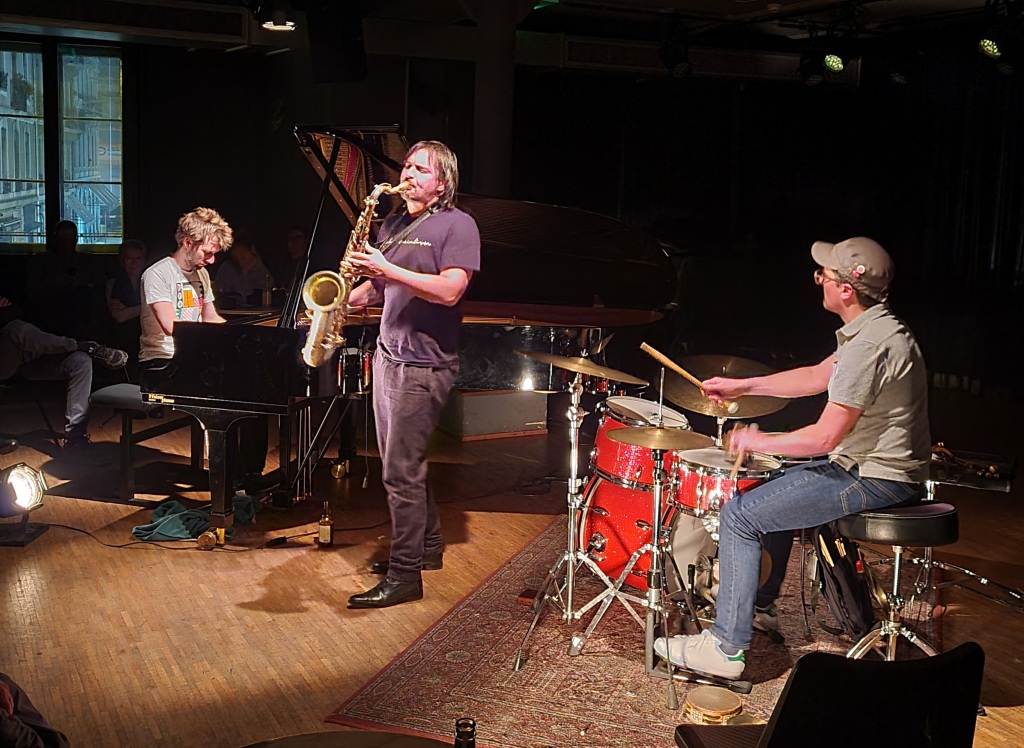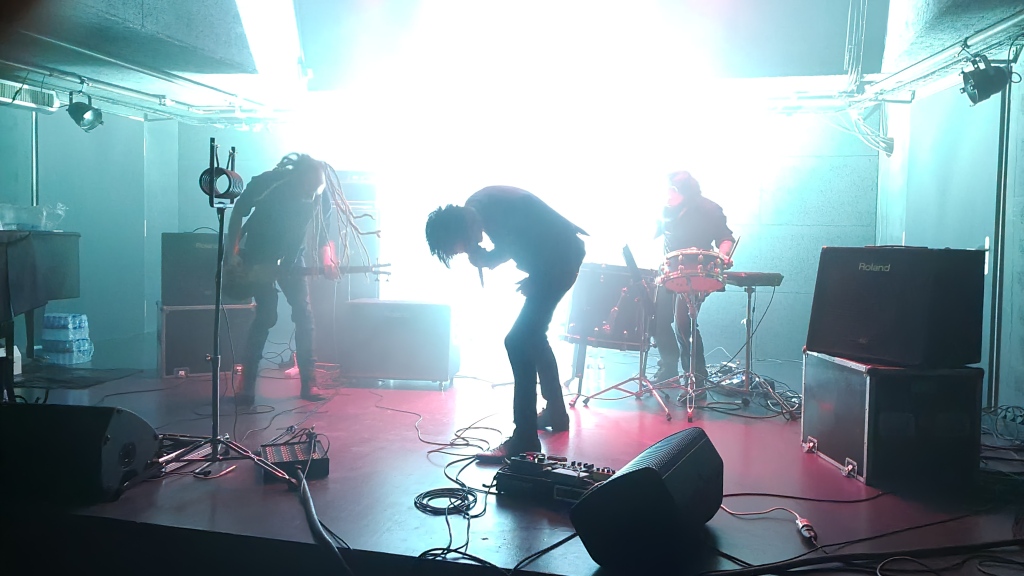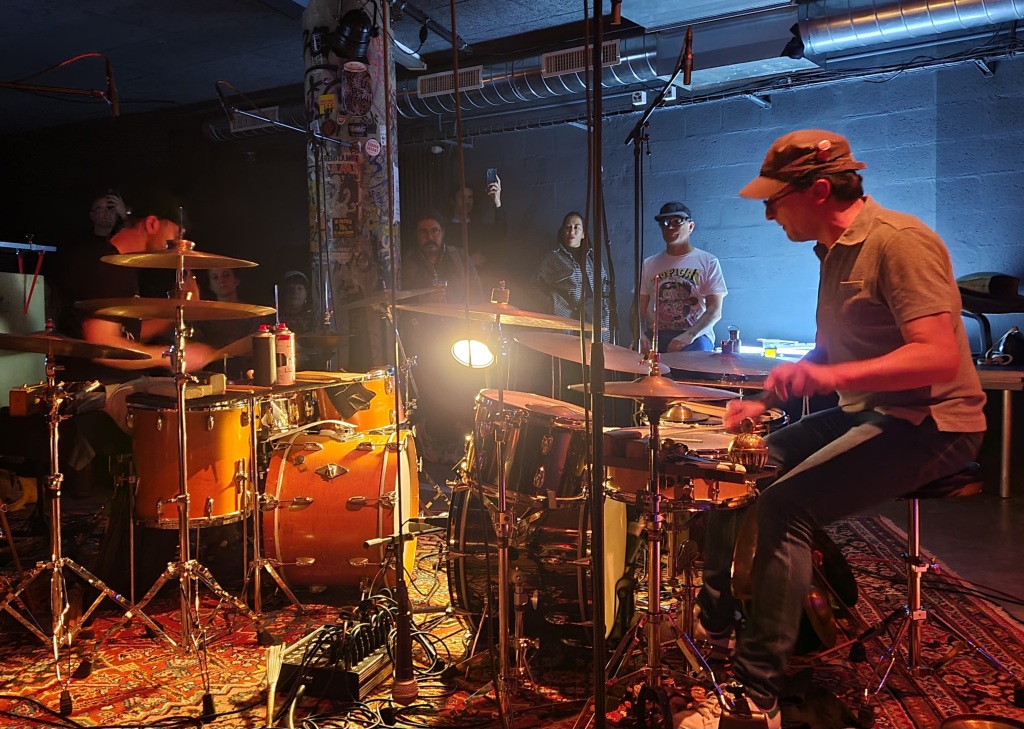Here was a trio of concerts that amply reinforced Cave 12’s claim to be one of the most important centres for underground music in Europe, if not the world. Utilizing to the max the considerable heft of the club’s PA, these three affiliated musicians presented a compelling case for the continued health of electronic noise music, particularly in its modular synth incarnation (there was not a laptop in sight).
By way of context it should be noted that both Russell Haswell and Bruce Gilbert have released several albums on Peter Rehberg’s Editions Mego label and its predecessor, plain old Mego. Meanwhile the associations between Haswell and Gilbert reach even further back, to 1995 and the Disobey club at Upstairs at the Garage in Islington, which they co-founded along with Blast First label head Paul Smith. A brief autobiographical digression follows:
I lived in London for most of the 1990s, and looking back at that decade now I realize that it was some kind of golden age for me as far as live music was concerned. At that time London had not yet succumbed to the virus of gentrification; the Astoria, where I saw Spiritualized, The Divine Comedy and American Music Club, was still in its prime location at the top of Charing Cross Road. Further along on Tottenham Court Road, I saw an early Godspeed You! Black Emperor gig in a tiny basement club called the Embassy Rooms. On the experimental side the London Musicians Collective was in full swing, putting on shows by the likes of :zoviet*france: and AMM in places like the Spitz, the Conway Hall and the Bridewell Theatre. Then there were the post-industrial types, with rare, precious concerts by the likes of Whitehouse (The Garage), Death in June (New Cross Venue, Charlton House) and Current 93 (New Cross Venue again, Walthamstow Royal Standard).
As for Disobey itself, I was by no means a regular at its evenings, but I do remember seeing FM Einheit of Einstürzende Neubauten pushing lumps of rock around a table, the writer Stewart Home in full deranged ranter mode and Bruce Gilbert of Wire DJing from a glass booth in his guise as The Beekeeper. (Actually, all three of these might have been on the same evening.) Then there was the time Finnish electronic trio Panasonic played a gig in a car park somewhere in east London, driving an armoured vehicle that had been fitted with a PA system round and round in circles. There were no advance tickets for Disobey; you had to call a number, listen to a recorded message which gave details of the next event, and leave a message on their answerphone to put your name on the list. In fact I seem to remember that I failed to do this for the FM Einheit evening, which owing to the Neubauten connection (even though Einheit had left Neubauten by that time) was sold out. I only got in because I had a passing acquaintance with Stewart Home, who kindly brought me in as his guest and allowed me to bypass the considerable queue on the pavement outside.
When Rehberg and Haswell appeared as a duo for the first time at Cave 12 back in September, they tempered their natural tendency towards confrontation with a strong dose of playfulness. The 45-minute set (now available as a paid download from the Editions Mego Bandcamp site) was a bracing, intermittently abrasive mix of ear-bleeding frequencies, scabrous drones and feverish, clanking rhythms. Volcanic outbursts of white-hot energy erupted from the dense circuitry of pulses and tones formed by the two musicians’ respective modular synth setups. If it was sometimes hard to make out where Rehberg’s contributions ended and Haswell’s began, that was less due to any perceived similarity of approach and more to the single-minded glee with which the piece careered to its inexorable conclusion.
Rehberg’s solo appearance in January (under the name Pita, which strictly speaking is only used for his solo projects) was an altogether darker affair. The set would not have sounded out of place on Kevin Martin’s epochal Isolationism compilation, consisting as it did of frosty, industrial drones punctuated by occasional interventions – starlit frequencies, stricken attempts at movement, blasts of agitated static. This set was also made available on the Editions Mego Bandcamp site, although it was very much a blink-and-you’ll-miss-it thing, since the paid download was only available for 24 hours.
Finally, Haswell and Gilbert each presented solo pieces at a concert last month – my last evening out, as it happened, before the coronavirus nightmare descended on western Europe. I wasn’t especially taken with Gilbert’s short opening set, which relied heavily on low-end drones that lingered stubbornly and never really went anywhere. Coupled with this, Gilbert was sitting down. Maybe it’s just me, but I find the performative aspect of electronic music (never entirely satisfying at the best of times) distinctly lacking when the musician chooses to sit down, rather than stand up as both Rehberg and Haswell did. In this case, Gilbert’s somewhat diffident onstage demeanour gave him the distracted air of an Open University electronics student doing a practical exam.
No such quibbles over Russell Haswell’s set, which gave the evening a much-needed jolt with a barrage of short, devastating body blows that never gave the audience time to recover. The set proceeded according to the principles of sound as a weapon employed by Joe Banks’ Disinformation project – no great surprise in itself, given that Banks also played the Disobey club and that Haswell worked on Disinformation’s 1996 R&D album. Swarming with jackhammer rhythms, ominous frequencies and strafing salvoes of noise, the set was a riotous collision of industrial austerity and punk attitude. Meanwhile, the music found a witty correlative in Haswell’s exuberant between-song introductions, which gave preposterous titles to some of the pieces (sample titles: “I’ve Seen Impaled Nazarene Fourteen Times”, “Manoeuvring Characteristics Augmentation System”, “Always Check Their Instagram”). While his genial brand of showmanship had the audience in gales of laughter, Haswell’s real gift lies in his unforgiving and uncompromising manipulation of sound to brutal effect.



